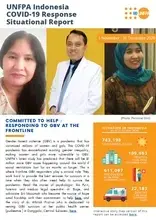
UNALA aims to establish a network of private sector providers working closely with youth networks to provide youth with SRH information and services. © UNFPA Indonesia
Jakarta. For decades Indonesia was considered a pioneer in family planning and reproductive health. Large-scale initiatives funded by the government and supported by the United Nations Population Fund (UNFPA) assisted women and families managing their health long before a worldwide movement was established in the 1990s.
But the targeting of youth sexual and reproductive health has always fallen short. Each year around 1.7 million women under the age of 24 give birth — and almost half of those are teenagers. Youth pregnancies can put both mother and child at risk, forcing many girls and young women prematurely out of education.
It is in the tradition of innovation that UNFPA has established Unala — reproductive health clinics targeting youth clients — using a development framework known as social franchising. The clinics aim to empower clients and use health as a tool to guarantee job opportunities and education.
Unala was first developed in Indonesia in 2012, says Dr. Margaretha Sitanggang, the UNFPA Indonesia national program officer for youth and adolescent sexual and reproductive health, before being formally launched mid-2014. With the pilot program currently underway in Yogyakarta, an area chosen for it’s high concentration of teenagers and university students, the success has been immediate.
The program has already upgraded its seven clinics across five districts of the city and now boasts nine doctors attending a growing number of clients.
Margaretha compares the Indonesian reproductive health climate to that of Latin America — both regions in which, as she says, “social and religious conservatism has constrained the willingness and capacity of governments to meaningfully address the sexual and reproductive health needs of youth.”
UNFPA has found that by embracing the private sector these issues can be neutralized. Social franchising is not traditionally used for youth programs, but has found success with Unala.
“Social franchising draws on commercial franchising techniques to increase access to and improve the quality of these services,” Margaretha said.
“Unala aims to establish a network of private service providers working closely with youth networks to provide a comprehensive package of appropriate, high-quality and youth-friendly sexual and reproductive health services for young people.”
Indonesia’s young population has become a priority for public health as the demographic graduates in to adulthood.

UNALA's pilot programme was launched in Yogyakarta in mid-2014.© UNFPA Indonesia
“During the next 15 years, young people in Indonesia will drive economic and social change,” says Jose Ferraris, UNFPA Indonesia’s representative. “This is an experiment and the first time that a social franchising approach for adolescent sexual and reproductive health has been trialled in Indonesia. We are trying to fill in the gaps in terms of information and services that are provided to young people.”
“It is within UNFPA’s mandate to promote the empowerment and well-being of young people and to ensure their safe tradition to adulthood,” Ferraris said.
For Agung (not his real name), a 20-year-old university student in Yogyakarta, accessing services through Unala has proved valuable. He learned about the clinic after his sister told him about a creative writing workshop held at Unala.
The workshop revolved around sexual and reproductive health themes and Agung found himself interested in the clinic and the wide range of services it provides.
“I consulted on a wide range of male reproductive health problems,” he said. “I also consulted about maintaining healthy relationships with others.”
Agung received advice about keeping a healthy lifestyle, which he has since shared among his peers — along with information about accessing the low-cost clinic for themselves.
He was drawn to the clinic’s focus on youth services and it’s non-judgmental environment.
“There are reproductive health services out there, but none of them are youth-friendly. The services they provide don’t really make young people feel comfortable enough to ask for counseling.”
“This is because services are subjective from a doctor’s point of view, which doesn’t usually consider the youth perspective,” he said.
Creating a stigma-free environment is crucial to youth-oriented sexual health as it allows visitors to the clinic to find the information they need, without fear of shaming or judgment.
“At Unala I can discuss everything with the doctor. They did not judge me after I asked several questions about sexual and reproductive health. I felt I got correct and comprehensive information,” Agung said.

There are currently seven UNALA clincs across five disctricts in Yogyakarta.© UNFPA Indonesia
Dr. Suharno, who practices at the clinic, agrees that creating an open and frank environment is key to the success of the program.
“Because of the stigma with reproductive health, teenagers especially do not seek out health advice, which results in them not accessing services available from professionals — which puts them at risk of harm to their health,” he said.
Most of Suharno’s patients are aged between 15 and 24 years old and seek advice over a variety of sexual and reproductive health issues.
“They usually seek information or services for common medical treatments, consultations for irregular menstruation, sexually transmitted diseases, menstrual pain and so on.”
The success of Unala in Yogyakarta is promising for Indonesian youths across the archipelago.
“The scheme can be replication nationwide. It has great potential to transform sexual and reproductive health information and services for youth in Indonesia,” said Doctor Margaretha Sitanggang.
To access Unala services, check Unala.net.
This article was originally published in The Jakarta Globe.


